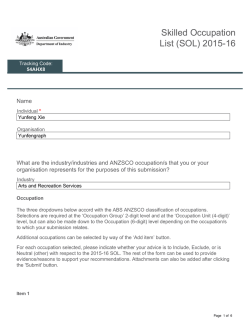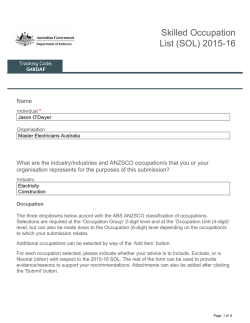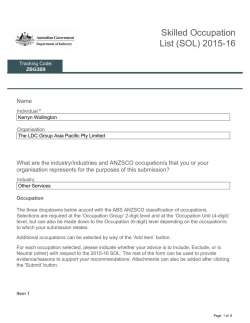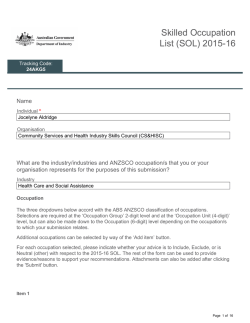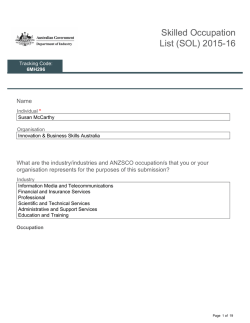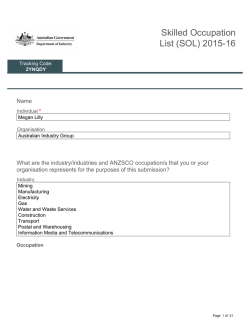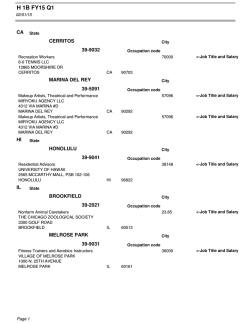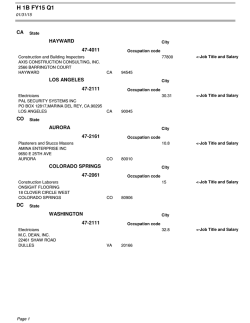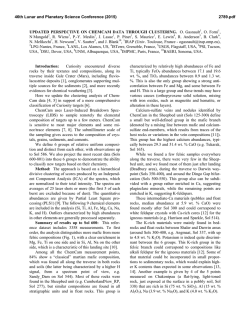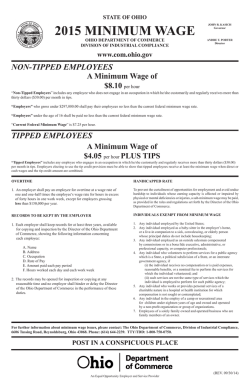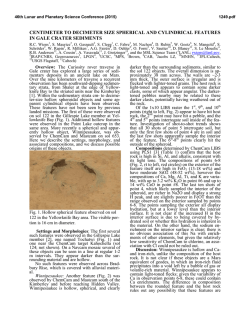
Skilled Occupation List (SOL) 2015-16
Skilled Occupation List (SOL) 2015-16 Tracking Code: JTRTKX Name Individual * Bob Paton Organisation Manufacturing Skills Australia What are the industry/industries and ANZSCO occupation/s that you or your organisation represents for the purposes of this submission? Industry Manufacturing Occupation The three dropdowns below accord with the ABS ANZSCO classification of occupations. Selections are required at the ‘Occupation Group’ 2-digit level and at the ‘Occupation Unit (4-digit)’ level, but can also be made down to the Occupation (6-digit) level depending on the occupation/s to which your submission relates. Additional occupations can be selected by way of the ‘Add item’ button. For each occupation selected, please indicate whether your advice is to Include, Exclude, or is Neutral (other) with respect to the 2015-16 SOL. The rest of the form can be used to provide evidence/reasons to support your recommendations. Attachments can also be added after clicking the 'Submit' button. Item 1 Page 1 of 19 Occupation Group * Specialist Managers Occupation Unit * Production Managers Occupation Production Manager (Manufacturing) 133512 Summary advice for 2015-16 SOL * Include Exclude Neutral Exclude Neutral Item 2 Occupation Group * Specialist Managers Occupation Unit * Other Specialist Managers Occupation Environmental Manager 139912 Summary advice for 2015-16 SOL * Include Item 3 Occupation Group * Specialist Managers Occupation Unit * Other Specialist Managers Occupation Laboratory Manager 139913 Page 2 of 19 Summary advice for 2015-16 SOL * Include Exclude Neutral Item 4 Occupation Group * Specialist Managers Occupation Unit * Other Specialist Managers Occupation Quality Assurance Manager 139914 Summary advice for 2015-16 SOL * Include Exclude Neutral Item 5 Occupation Group * Design, Engineering, Science and Transport Professionals Occupation Unit * Fashion, Industrial and Jewellery Designers Occupation Industrial Designer 232312 Summary advice for 2015-16 SOL * Include Exclude Neutral Item 6 Page 3 of 19 Occupation Group * Design, Engineering, Science and Transport Professionals Occupation Unit * Chemical and Materials Engineers Occupation Materials Engineer 233112 Summary advice for 2015-16 SOL * Include Exclude Neutral Item 7 Occupation Group * Design, Engineering, Science and Transport Professionals Occupation Unit * Industrial, Mechanical and Production Engineers Occupation All Summary advice for 2015-16 SOL * Include Exclude Neutral Item 8 Occupation Group * Design, Engineering, Science and Transport Professionals Occupation Unit * Other Engineering Professionals Occupation Biomedical Engineer 233913 Page 4 of 19 Summary advice for 2015-16 SOL * Include Exclude Neutral Item 9 Occupation Group * Design, Engineering, Science and Transport Professionals Occupation Unit * Other Engineering Professionals Occupation Aeronautical Engineer 233911 Summary advice for 2015-16 SOL * Include Exclude Neutral Item 10 Occupation Group * Design, Engineering, Science and Transport Professionals Occupation Unit * Other Engineering Professionals Occupation Environmental Engineer 233915 Summary advice for 2015-16 SOL * Include Exclude Neutral Item 11 Page 5 of 19 Occupation Group * Design, Engineering, Science and Transport Professionals Occupation Unit * Chemists, and Food and Wine Scientists Occupation Food Technologist 234212 Summary advice for 2015-16 SOL * Include Exclude Neutral Item 12 Occupation Group * Engineering, ICT and Science Technicians Occupation Unit * Science Technicians Occupation Science Technicians nec 311499 Summary advice for 2015-16 SOL * Include Exclude Neutral Item 13 Occupation Group * Engineering, ICT and Science Technicians Occupation Unit * Electrical Engineering Draftspersons and Technicians Occupation All Page 6 of 19 Summary advice for 2015-16 SOL * Include Exclude Neutral Item 14 Occupation Group * Engineering, ICT and Science Technicians Occupation Unit * Mechanical Engineering Draftspersons and Technicians Occupation All Summary advice for 2015-16 SOL * Include Exclude Neutral Item 15 Occupation Group * Engineering, ICT and Science Technicians Occupation Unit * Other Building and Engineering Technicians Occupation Maintenance Planner 312911 Summary advice for 2015-16 SOL * Include Exclude Neutral Item 16 Page 7 of 19 Occupation Group * Engineering, ICT and Science Technicians Occupation Unit * Other Building and Engineering Technicians Occupation Metallurgical or Materials Technician 312912 Summary advice for 2015-16 SOL * Include Exclude Neutral Item 17 Occupation Group * Automotive and Engineering Trades Workers Occupation Unit * Sheetmetal Trades Workers Occupation Summary advice for 2015-16 SOL * Include Exclude Neutral Item 18 Occupation Group * Automotive and Engineering Trades Workers Occupation Unit * Structural Steel and Welding Trades Workers Occupation All Page 8 of 19 Summary advice for 2015-16 SOL * Include Exclude Neutral Item 19 Occupation Group * Automotive and Engineering Trades Workers Occupation Unit * Aircraft Maintenance Engineers Occupation Summary advice for 2015-16 SOL * Include Exclude Neutral Item 20 Occupation Group * Automotive and Engineering Trades Workers Occupation Unit * Metal Fitters and Machinists Occupation Fitter-Welder 323213 Summary advice for 2015-16 SOL * Include Exclude Neutral Item 21 Page 9 of 19 Occupation Group * Automotive and Engineering Trades Workers Occupation Unit * Precision Metal Trades Workers Occupation Locksmith 323313 Summary advice for 2015-16 SOL * Include Exclude Neutral Item 22 Occupation Group * Automotive and Engineering Trades Workers Occupation Unit * Precision Metal Trades Workers Occupation Watch and Clock Maker and Repairer 323316 Summary advice for 2015-16 SOL * Include Exclude Neutral Item 23 Occupation Group * Construction Trades Workers Occupation Unit * Floor Finishers Occupation All Page 10 of 19 Summary advice for 2015-16 SOL * Include Exclude Neutral Exclude Neutral Item 24 Occupation Group * Construction Trades Workers Occupation Unit * Glaziers Occupation Summary advice for 2015-16 SOL * Include Item 25 Occupation Group * Other Technicians and Trades Workers Occupation Unit * Canvas and Leather Goods Makers Occupation All Summary advice for 2015-16 SOL * Include Exclude Neutral Item 26 Page 11 of 19 Occupation Group * Other Technicians and Trades Workers Occupation Unit * Upholsterers Occupation Summary advice for 2015-16 SOL * Include Exclude Neutral Item 27 Occupation Group * Other Technicians and Trades Workers Occupation Unit * Cabinetmakers Occupation Summary advice for 2015-16 SOL * Include Exclude Neutral Item 28 Occupation Group * Other Technicians and Trades Workers Occupation Unit * Wood Machinists and Other Wood Trades Workers Occupation Page 12 of 19 Summary advice for 2015-16 SOL * Include Exclude Neutral Item 29 Occupation Group * Other Technicians and Trades Workers Occupation Unit * Boat Builders and Shipwrights Occupation Summary advice for 2015-16 SOL * Include Exclude Neutral Item 30 Occupation Group * Other Technicians and Trades Workers Occupation Unit * Chemical, Gas, Petroleum and Power Generation Plant Operators Occupation Gas or Petroleum Operator 399212 Summary advice for 2015-16 SOL * Include Exclude Neutral Item 31 Page 13 of 19 Occupation Group * Other Technicians and Trades Workers Occupation Unit * Other Miscellaneous Technicians and Trades Workers Occupation Plastics Technician 399916 Summary advice for 2015-16 SOL * Include Exclude Neutral Item 32 Occupation Group * Other Technicians and Trades Workers Occupation Unit * Other Miscellaneous Technicians and Trades Workers Occupation Technicians and Trades Workers nec 399999 Summary advice for 2015-16 SOL * Include Exclude Neutral Item 33 Occupation Group * Automotive and Engineering Trades Workers Occupation Unit * Motor Mechanics Occupation Small Engine Mechanic 321214 Page 14 of 19 Summary advice for 2015-16 SOL * Include Exclude Neutral Item 34 Occupation Group * Automotive and Engineering Trades Workers Occupation Unit * Metal Fitters and Machinists Occupation Metal Fitters and Machinists nec 323299 Summary advice for 2015-16 SOL * Include Exclude Neutral Are there any occupations that you represent where there is evidence of imbalances in the demand for and supply of skills in the medium-to-long term? * During this year MSA has become aware of several supply side issues. The supply side issues raised by our stakeholders have all been around the impact of changed funding arrangements at both state and federal level. Increasingly as each state moves to a contestable funding model, industry is reporting that it is becoming more difficult to access affordable training which meets its needs. This is due in a large part by RTOs finding that it is not financially sustainable to deliver training in thin markets and/or that access to funding to replace/update technology is unavailable. This is projected by stakeholders to have a long-term impact on access to the skilled workers required for an innovative and thriving manufacturing sector as less people will be trained. This will lead to a shortage of appropriately skilled workers to replace an ageing workforce. The down turn in apprenticeship numbers is also impacting supply of skilled workers across all of MSA's industries. Specifically, MSA has received feedback from the Furniture Industry Association of Australia (FIAA) that they are very concerned that changes to funding arrangements will lead to a shortage of cabinet makers, wood machinists and kitchen and inbuilt furniture installers within Page 15 of 19 the next four to five years. The Specialised Textiles Association (STA) reports that cuts to funding has resulted in the discontinuation of the Certificate II in Blinds and Awnings which was being used in New South Wales to meet licensing requirements. While Qantas' restructuring of its maintenance workforce has lead to an increase in the number of licensed aircraft mechanics becoming available, this workforce lacks the skills required to transition to the General Aviation sector which currently has significant skill shortages. As much of the general aviation work is in regional areas, attracting and retaining staff with the required skills is difficult. The resources sector is moving from the construction phase to the operations phase leading to a change in the skilled workers require to meet future needs. There is still a demand for construction trades workers. MSA is seeing an increase in demand for oil and gas production workers, maintenance engineers and trades workers such as heavy diesel mechanics, pipe welders, fitter mechanics. However the transition from construction to production within the oil and gas sector is not proceeding at the same rate across the country and there still remains significant demand for engineers and engineering trades workers, especially for coded welders with oil and gas experience. Enterprises such as Boral are reporting that they are very concerned that within five years they will not have sufficient skilled workers within their enterprises to meet industry demands. The average of workers at Boral is 50 and Boral is not able to access workers either with current skills or who have an interest in training in this industry to meet projected replacement demand. Boral sees migration (either via permanent skilled migration programs or 457 visas) as the only options available to them to respond to this situation. New and emerging skill areas such as fibre composites, additive manufacturing, plastics welding, autonomous systems, small engine mechanics with the skills to repair and maintain small electrical engines for computerised and digitised embroidery machines are still seen as niche or thin market areas by training providers and are not yet considered financially viable areas in which to deliver training. There is also a shortage of people with the required skills who are able to deliver training in these areas. Is there evidence of imbalances in the demand for and supply of skills in the medium-to-long term in non-metropolitan areas? If so, can you indicate in what part of Australia and the number in the occupation in over or undersupply. MSA is aware that there are definitely differences in skill supply and demand between regional and metro areas. The majority of oil and gas projects are located in non-metropolitan areas. As a result resources enterprises are required to recruit from metropolitan areas through the use of the fly-in, fly-out (FIFO) workforce.The increased growth in the FIFO workforce has lead to increased work in the general aviation industry in regional areas, with a resulting demand for licensed aircraft mechanical engineers (LAMEs) with the appropriate general aviation licences. The transitioning of the resources industry from the construction phase to the production phase is also creating skills imbalances in regional areas. Most processing plants are located in nonmetropolitan areas which are unable to meet the demand for gas plant operators and maintenance technicians. Access to training in non-metropolitan areas is also constrained due to Page 16 of 19 changes to funding, the costs associated with servicing thin markets and access to appropriate technology and facilities. Non-metropolitan areas are also concerned about the low numbers of people undertaking Australian Apprenticeships, especially as the workforce ages. Regional areas are seeing the loss of essential skills as many small family businesses close through the lack of suitably trained people to take the business over. examples of skilled occupations being lost as cabinet makers and wood machinists, fabricators and sheet metal workers. The skills required in non-metropolitan areas are also different from those required in metropolitan areas, alrgely due to the much larger population base in metropolitan areas. In nonmetropolitan areas, workers are required to have a much broader skill base to meet the needs of the region. An example of the differences in the skills needed is clearly evidenced in the skills required by recreational vehicle service technicians. In non-metropolitan areas, recreational vehicle service technicians are required to be able to service all parts of a recreational vehicle/ caravan, including gas and electrical components.In metropolitan areas, this work is often outsourced to specialist technicians. As Australia's population ages, the number of people taking to the roads of Australia as 'grey nomads' is expected to increase and the demand for broad skilled recreational vehicle service technicians will grow in the non-metropolitan areas. The same situation is experienced across all skill areas and the demand for people with broadbased skills in non-metropolitan areas is expected to grow as the existing workforce retires. Are there any occupations which require formal licensing or registration arrangements in order to practice/perform in this occupation? For example: • Midwives are required to register with the nurses board in their state or territory • Panelbeaters are required to be registered or certified with the state Motor Vehicle Repair Industry Authority Recreational Vehicles - electrical. plumbing, automotive in some states. In Engineering technicians performing non-destructive testing - most are required to be certified to the relevant ISO/AS standards Shade sails installers - licencing required in Queensland and New South Wales Kitchen and bathroom installers - licencing required in Queensland and New South Wales Glass and glazing workers - licencing required in Queensland for working on construction projects Construction induction card (white card) needed for all cabinetmaking, glass and glazing, flooring technology, kitchen and bathroom installations, blinds, awnings and all fabric structures installations. Air-conditioning installer - require refrigerant handling licencing by the Australian Refrigeration Council (ARCtick) Flooring installers need a construction licence in Queensland Welding and marine craft construction require various licences In the General Aviation sector, the Civil Aviation Safety Authority (CASA) licencing requirements changing. Page 17 of 19 Is it expected that your employment sector will be impacted by any medium-to-long term trends which will impact upon demand and/or supply (excluding costs associated with training, labour hire, and international sponsorship)? Please provide evidence (e.g. data source, policy document) which substantiates these claims. For example: • New benchmarks for childcare centres mandate increased staff-to-child ratios and higher qualification standards for childcare workers. Government infrastructure projects in the pipeline will create increased demand for skilled occupations under MSA's coverage. This includes laboratory technicians to ensure quality standards are being met where roads are being built. Non-destructive testing skills will be required for materials technicians and testers working on major infrastructure projects. Concrete, brick and asphalt production is expected to increase with demand not only from infrastructure projects but also from a rise in residential construction and this will lead to a shortage of production workers, concrete batchers and technicians in a range of occupational areas. The demand for people with engineering skills will decrease as the mining industry moves from construction to production. This movement will also create demand in other areas where for example, there will be an increased demand for maintenance technicians and processing plant operators, to assist and monitor production. Industries in transition, eg automotive, will see people coming out of the automotive supply chain who will need to be reskilled/upskilled into emerging industries. Examples of emerging technologies include medical technology, additive manufacturing and new material productions such as advanced materials and composites. The medium-long term impacts on employment from the change in government policies, such as changes to the Renewable Energy Target, the Direct Action Climate Plan, and the Higher Education reforms are yet to be felt. Please provide any other information you consider relevant evidence to support your submission For example, you may know of some independent studies about your occupation that supports your advice to us. Would you like to make any additional comments on the SOL? Page 18 of 19 Please provide the name, position and contact details of a person within your organisation who is willing to be contacted if any further information or follow-up is required. Name * Bob Paton Position * Chief Executive Officer Contact details * Phone (02) 9955 5500 [email protected] All information, including name and address details, contained in submissions will be made available to the public on the Department of Industry website unless you indicate that you would like all or part of your submission to remain in confidence. Automatically generated confidentiality statements in emails do not suffice for this purpose. Respondents who would like all or part of their submission to remain in confidence should provide this information in an email to SOL@industry. gov.au . Legal requirements, such as those imposed by the Freedom of Information Act 1982, may affect the confidentiality of your submission. Page 19 of 19
© Copyright 2026
